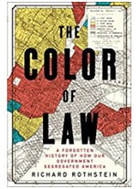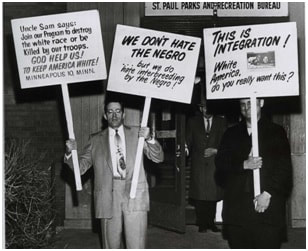|
Some suggested resources from Pauline Eichten I’ve always blamed banks and insurance companies for redlining neighborhoods, essentially creating slums and causing “white flight” to the suburbs. Instead, I learned that it was deliberate actions on the part of government at all levels that created, promoted and enforced segregated neighborhoods and white-only urban and suburban communities. It was these actions, as well as those of banks, insurance companies, realtors, etc., that created the conditions that left African-Americans little choice in where to live and almost no opportunity to create assets through homeownership. Read Richard Rothstein’s book, The Color of Law, to learn the details. Then check out the “Mapping Prejudice Project,” an effort to identify the racial restrictions embedded in Minneapolis property deeds. (Might the deed to your home contain racially restrictive language?) I’ve also included a link to a recent talk by a Harvard University sociology and public health professor, “The Fierce Urgency of Now,” discussing how the physical and mental health of all Americans is threatened by institutional racism. And last, but not least, check out “The Case for Reparations,” by Ta-Nehisi Coates, a devastating recounting of the ways in which African-Americans have been deliberately denied access to all the ways in which White Americans have prospered.  The Color of Law: A Forgotten History of How Our Government Segregated America, by Richard Rothstein, Liveright Publishing Corporation, May 2, 2017 Rothstein is a leading authority on housing policy. In this extensively researched book, he makes abundantly clear that it was laws and policy decisions passed by local, state and federal governments that promoted the discriminatory housing patterns that continue to this day. The Fair Housing Act of 1968 prohibited future discrimination, but did nothing to reverse residential patterns that had become deeply embedded. See also Pedro Nicolaci da Costa's article: "Public housing plays a huge role in racial segregation and inequality — but not in the way most people think"  The “Mapping Prejudice Project” is working to identify and map racial restrictions buried in historic Minneapolis property deeds. Their goal is to find every single racially restrictive covenant — a now-illegal type of deed restriction that prevented the sale of a home to a black person or, in some cases, anyone other than a white person — and plot them on a map of Minneapolis. The early results show, not too surprisingly, that the neighborhoods where racial covenants were clustered in the early part of the 20th century are still some of the city’s whitest. Mapping Prejudice is looking for volunteers to review property deeds online to determine if there are racial restrictions. “The Fierce Urgency of Now: How Can We Better Understand and Effectively Address Racial Inequities in Health.” A talk by Harvard University sociology and public health professor David Williams, October 6, 2017, at the University of Minnesota Humphrey School. Williams says discrimination, racism and segregation are creating what he calls "a truly rigged system," and that the physical and mental health of all Americans is threatened by individual and institutional racism. He cites numerous studies that speak to segregation and its harmful effects. His 35-minute talk is followed by a panel discussion moderated by University of Minnesota professor Larry Jacobs. Panelists included former Minnesota Health Commissioner and Allina executive Jan Malcolm and Sahra Noor, a nurse and CEO of People's Center Health Services.. See also his talk on YouTube: “The Social Factors of Health” David R. Williams is the Florence Sprague Norman and Laura Smart Norman Professor of Public Health at the Harvard T.H. Chan School of Public Health and Professor of African and African American Studies and Sociology at Harvard University. Dr. Williams is an internationally recognized social scientist focused on social influences on health.  “The Case for Reparations,” by Ta-Nehisi Coates, The Atlantic, June 2014. “Two hundred fifty years of slavery. Ninety years of Jim Crow. Sixty years of separate but equal. Thirty-five years of racist housing policy. Until we reckon with our compounding moral debts, America will never be whole.” “If you sought to advantage one group of Americans and disadvantage another, you could scarcely choose a more graceful method than housing discrimination. Housing determines access to transportation, green spaces, decent schools, decent food, decent jobs, and decent services. Housing affects your chances of being robbed and shot as well as your chances of being stopped and frisked. And housing discrimination is as quiet as it is deadly.… Housing discrimination is hard to detect, hard to prove, and hard to prosecute."
0 Comments
Leave a Reply. |
Topics
All
Beloved Community ResourcesUnity Justice Database
Team Dynamics House of Intersectionality Anti-Racism Resources in the Unity Libraries Collection Creative Writers of Color in Unity Libraries The History of Race Relations and Unity Church, 1850-2005 Archives
July 2024
Beloved Community Staff TeamThe Beloved Community Staff Team (BCST) strengthens and coordinates Unity’s antiracism and multicultural work, and provides opportunities for congregants and the church to grow into greater intercultural competency. We help the congregation ground itself in the understanding of antiracism and multiculturalism as a core part of faith formation. We support Unity’s efforts to expand our collective capacity to imagine and build the Beloved Community. Here, we share the stories of this journey — the struggles, the questions, and the collaborations — both at Unity and in the wider world.
The current members of the Beloved Community Staff Team include Rev. Kathleen Rolenz, Rev. KP Hong, Rev. Lara Cowtan, Drew Danielson, Laura Park, Lia Rivamonte and Angela Wilcox. |